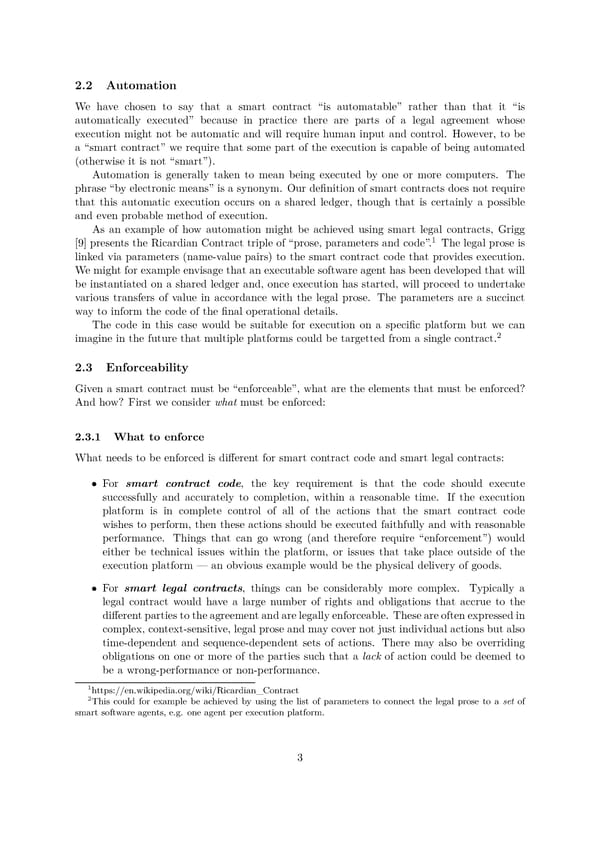2.2 Automation We have chosen to say that a smart contract “is automatable” rather than that it “is automatically executed” because in practice there are parts of a legal agreement whose execution might not be automatic and will require human input and control. However, to be a “smart contract” we require that some part of the execution is capable of being automated (otherwise it is not “smart”). Automation is generally taken to mean being executed by one or more computers. The phrase “by electronic means” is a synonym. Our definition of smart contracts does not require that this automatic execution occurs on a shared ledger, though that is certainly a possible and even probable method of execution. As an example of how automation might be achieved using smart legal contracts, Grigg [9] presents the Ricardian Contract triple of “prose, parameters and code”.1 The legal prose is linked via parameters (name-value pairs) to the smart contract code that provides execution. Wemightfor example envisage that an executable software agent has been developed that will be instantiated on a shared ledger and, once execution has started, will proceed to undertake various transfers of value in accordance with the legal prose. The parameters are a succinct way to inform the code of the final operational details. The code in this case would be suitable for execution on a specific platform but we can imagine in the future that multiple platforms could be targetted from a single contract.2 2.3 Enforceability Given a smart contract must be “enforceable”, what are the elements that must be enforced? And how? First we consider what must be enforced: 2.3.1 What to enforce What needs to be enforced is different for smart contract code and smart legal contracts: • For smart contract code, the key requirement is that the code should execute successfully and accurately to completion, within a reasonable time. If the execution platform is in complete control of all of the actions that the smart contract code wishes to perform, then these actions should be executed faithfully and with reasonable performance. Things that can go wrong (and therefore require “enforcement”) would either be technical issues within the platform, or issues that take place outside of the execution platform — an obvious example would be the physical delivery of goods. • For smart legal contracts, things can be considerably more complex. Typically a legal contract would have a large number of rights and obligations that accrue to the different parties to the agreement and are legally enforceable. These are often expressed in complex, context-sensitive, legal prose and may cover not just individual actions but also time-dependent and sequence-dependent sets of actions. There may also be overriding obligations on one or more of the parties such that a lack of action could be deemed to be a wrong-performance or non-performance. 1https://en.wikipedia.org/wiki/Ricardian_Contract 2This could for example be achieved by using the list of parameters to connect the legal prose to a set of smart software agents, e.g. one agent per execution platform. 3
 Position Paper | Smart Contract Templates Page 4 Page 6
Position Paper | Smart Contract Templates Page 4 Page 6